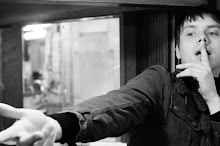Eshfahan
Coming to Eshfahan, I noticed one thing - I was really tired. As I got off the bus and dealt with the whole "Mister! Mister! Money change! Taxi!" business, I realised that Iran was starting to seriously piss me off. The young guy who put his face 10 cm from mine at the bus station felafel shop and proceeded to ask me inappropriately random personal questions certainly didn't help to make me feel "Welcome in Eshfahan Mister!"
Chinbotsu. This Japanese word means 'sinking ship' and usually is used to described a hobo backpacker who stays in a hotel for too long... I got to Amir Kabir Hostel by jumping on the first random bus heading in what seemed like the right direction. Dorm was full, but Junko had told me about the room with no bed. At 25,000 R ($3.50AUD) per night, "the mosque" has got to be the cheapest place in Eshfahan. Being "closer to God" (in the owners own words) has become addictive. The people here are great. Met a Czech couple heading to Afghanistan. Was about to go to Teheran and get myself an Afghan visa when Charlie turned up. A Malaysian student living in New Zealand, he happenned to have a tent and a desire to hang out with some Kurdish nomads. Hence, change of plan - we're meeting in Sanandaj on the 30th, then hiking through the villages near the Iraqi border.
However the strangest thing happened on my first night in Amir Kabir. Heading out the front door, I met none other than Eijiro-san - one of my favourite students from Japan. I'd actually been thinking about him a few weeks prior, given his interest in Eastern Europe. Well, the focus of interest has certainly changed. 10 minutes later we were out to see the Zarkuneh - a traditional Persian sport. Very weird: a group of guys in the middle of a ring engage in super-masculine feats of strength while another guy beats a drum and recites Hafiz.
The next day we hung out near the river, having some tea in a teahouse underneath one of the bridges' arches. Interesting atmosphere, with many people picnicing by the river. Aside from the riverside, the other main fat-camera-toting-German attraction in Eshfahan is the Emam Khomeni Square: home of 2 magnificent mosques and one palace. Ok, it's very beautiful, but it's also packed with tourist souveneir shops and most of it is under renovation : hence the difficulties in making decent photos. Still, I will be happy to sit here for two more days and do very little aside from strolling around the cit, playing Saz and eating icecream.

